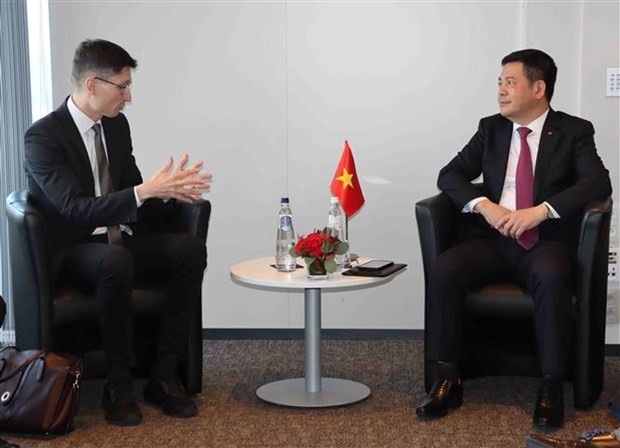 Minister of Industry and Trade Nguyen Hong Dien (right) meets Vice President of FESI Manuel Pauser on December 14 on the sidelines of the summit commemorating the 45th year of the EU-ASEAN diplomatic relations. (Photo: VNA)
Minister of Industry and Trade Nguyen Hong Dien (right) meets Vice President of FESI Manuel Pauser on December 14 on the sidelines of the summit commemorating the 45th year of the EU-ASEAN diplomatic relations. (Photo: VNA)
Speaking at a meeting with Vice President of FESI Manuel Pauser on December 14 on the sidelines of the summit commemorating the 45th year of the EU-ASEAN Diplomatic Relations, Mr. Dien emphasised that Vietnam has the ambition to export “made-by-Vietnam” products rather than “made-in-Vietnam” ones.
He said that with a stable supply in terms of output and quality of textile and sportswear, Vietnam hopes European Union (EU) enterprises will continue to consider and give priority to choosing it as their supplier in the coming time.
The EU-Vietnam Free Trade Agreement (EVFTA) has come into effect and Vietnam's textile, garment, and footwear products enjoy many tariff preferences, with much lower preferential tax rates compared with those under the most-favored-nation (MFN) scheme.
Minister Dien said that is a great advantage for EU businesses when choosing Vietnam as a partner to produce, supply, and import goods into the European market.
He said he hopes that FESI will strengthen exchanges and cooperation with Vietnam in human resources training for the textile, garment, and footwear industries so that Vietnamese workers will have better skills to be able to access and master new advanced technology and equipment.
FESI vice president Manuel Pauser hailed Vietnam’s efforts in controlling the Covid-19 pandemic and reopening productions, which make European investors trust in the safety of the country and its commitment to tackling difficulties.
The EU is the second largest importer of Vietnam's leather and footwear products with a turnover of US$4.5 billion in 2021, accounting for 25.1 percent of the industry's export turnover.
In the first 10 months of 2022, Vietnam's export turnover to this market reached $5.6 billion, a year-over-year increase of over 40 percent.
























